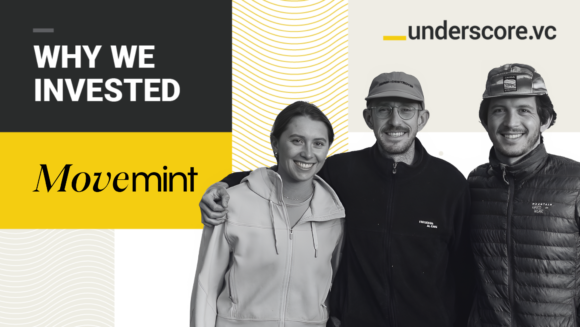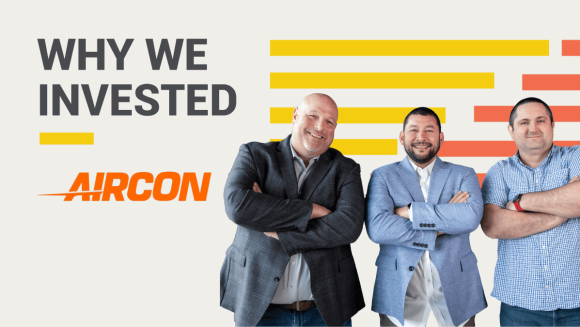Meet the Founder Transforming Conversational AI
In our series “Preparing for Lift-Off: 11 Founders Launching Bold New Startups,” we’re introducing the world to the members of our upcoming UFirst Summer Accelerator program. These are some of the most promising emerging entrepreneurs around and we couldn’t be more excited to share their stories with you. Dive into their journeys and discover the work they’re doing to push the boundaries of what’s possible.
This week we’re interviewing Karan Kashyap, Co-Founder of Posh, who is rethinking what’s possible with conversational AI and transforming how chatbots communicate with his other Co-Founders Ken Leidal and Matt McEachern.

After years of AI research at MIT, Karan, Ken, and Matt are stepping into the startup world with a unique chatbot platform that has quickly gained traction in a variety of industries. Find out more about their journey below and why Karan thinks we’re just at the tip of the iceberg when it comes to machines having conversations.
This is part 3 of 11 in our “Preparing for Lift-Off: 11 Founders Launching Bold New Startups” series created in partnership with growth marketing agency Ideometry. Tune in each week for another installment. Check out the first two interviews of the series with the Marlo and BusRight founders.
Tell us a bit about Posh.
Karan: Posh is a company that myself along with two co-founders founded out of MIT. We come from a natural language processing and machine learning background and we saw an opportunity to create a better platform for conversational AI or chatbots. Platforms in the market today are only focused on one subset of the overall chatbot development process, intent recognition. They don’t focus on a big problem called context understanding, which is the ability to understand the history of a conversation. So bots like Alexa or Siri are pretty good at taking directions — you can tell it to set the alarm or give you the weather — but it’s not really a conversational experience. But when in customer service, bi-directional conversations are almost always needed. We saw an opportunity to build a better platform with a fundamentally better way to manage context so as to have better conversations.
We started working on the platform while we were studying at MIT. By the time I graduated in 2017 with a masters in AI, we already had a few customers. One of the pilots we did was with a credit union. We stumbled upon that industry by chance. Fast forward to now and most of our primary customers are credit unions. That said, we also have customers in banking, retail, healthcare, telecom, and a few other spaces.
How did you come up with the idea?
Karan: While at school, I was learning the fundamentals behind the bots we use today, like Alexa. I was doing a lot of research in that area and I started to see where this technology was heading in the world. When my co-founders and I started trying to figure out what to focus on with our platform, we realized no one was focusing on context understanding. That’s where we saw an opening.
Do you have a mantra that drives your work?
Karan: Our mission is to make conversational AI more human. We want to elevate bots so that they’re able to communicate with humans the way humans communicate with humans.
What does the world look like when Posh succeeds?
Karan: I’d like to see our technology being used in every industry imaginable, though the primary use case is around customer service. Companies are able to use our platform to make better bots for things like processing returns, customer service, opening accounts, or literally anything that’s a routine, user-facing workflow and involves conversation, regardless of the vertical.
What will the future of Conversational AI look like, especially in terms of the human-AI relationship?
Karan: I think it will be pretty seamless. It’s how you’ll be communicating with your technology in the future. Today, you use mouses and keyboards. In the future, things will inevitably be different. Communication might be driven through eye motion or even through neural interfaces using your thoughts. Conversational AI is a huge part of that. Voice, messaging and language is much more natural than clicking and scrolling. While that may still be there, things are becoming more hands off. People use technology while they’re running, traveling, or even sleeping. The future of technology is going to be so much more immersive and integrative.
And in terms of our focus, there’s no reason for humans to be providing service for routine, easy questions that people ask. If you want to return a product or check the status of your package, you shouldn’t have to have to call. It should be easy for AI to automate that.
What drew you to UFirst?
Karan: I met up with Sherman Leung and chatted with Lily Lyman from the Underscore team at a conference a couple of months ago. They both seemed like really nice people who are focused on companies working on hard problems in emerging technologies, and that aligned well with what we’re doing. That’s first and foremost what drew us to Underscore. Secondly, we’re located in Boston so to have a program right in our backyard that connects us with interesting mentors and helps get us more exposure in the community is really awesome for us.
Being an entrepreneur, what are some of the biggest challenges you’ve faced along the way?
Karan: It’s a lot like being an artist. You have to create something from scratch that didn’t exist before. Then you have to convince a lot of people with money that what you’re doing is real and not B.S. — That’s kind of what an artist does too. I think that the hardest part is getting the ball rolling, but once people start believing in it everyone else starts getting on board as well. We’ve been working on this for a few years now. Initially, it was really hard when we were fresh out of college, but slowly we gained support from people who really believed in us and that has been invaluable as it increases our confidence that we are indeed adding value and makes the sell that much easier.
Starting a business is no easy task. What is the driving force that gets you out of bed every day and motivates you to build your business?
Karan: Our team — we’re an awesome group of about a dozen people now. They work hard and are very talented in what they do. Their conviction in what we do is super humbling. Even if I’m really tired or had a long day, I always come back and hang out with the team. They inspire me.
The other motivator is the traction we’re getting. It has been pretty crazy how far we’ve come in a year. I was in L.A. just last week presenting at a conference and will be in Japan next month doing the same. It’s exciting to have big companies thinking of Posh, and I think it demonstrates the credibility we’ve been able to build with our clients and with the market in general.
What’s the most valuable piece of advice you’ve received about being a founder?
Karan: Building a really good network — of potential talent, clients, mentors — and building it early, is extremely important. It is often who you know that matters. The best thing for someone who wants to start a company is to invest in meeting the right people as fast as possible. You’ll end up meeting people who are very forward thinking, and maybe they even believe in what you’re doing and know others to introduce you to. Once you prove yourself, those people can help you expand your reach. My advice is to take extra time to build a solid network all across the board.
Tune in every Wednesday for the next ten weeks as we release new interviews from our “Preparing for Lift-Off: 11 Founders Launching Bold New Startups” series.
Ideometry is a Boston-based full-service marketing agency serving a global client base. With a full suite of creative, development, and strategic services, Ideometry helps startups and Fortune 500 companies alike get the business results they’re looking for. If you’re doing something interesting, we’d love to hear from you. Get in touch with us at ideometry.com or email hello@ideometry.com










